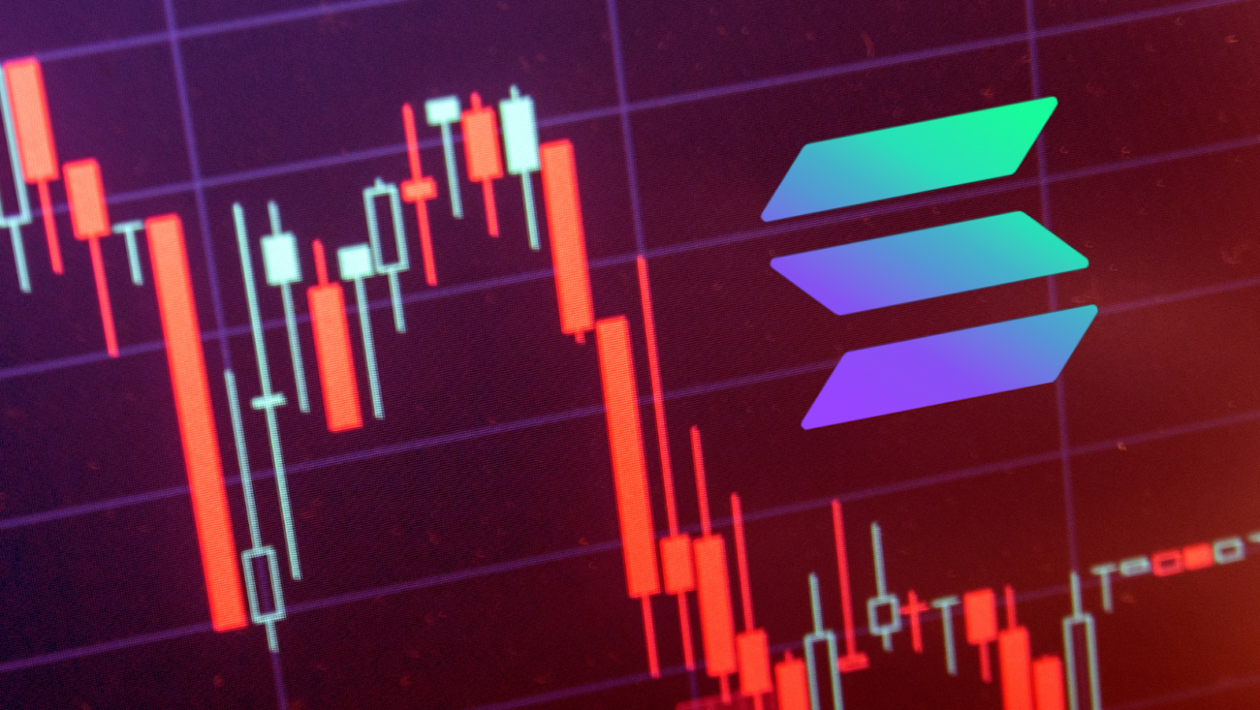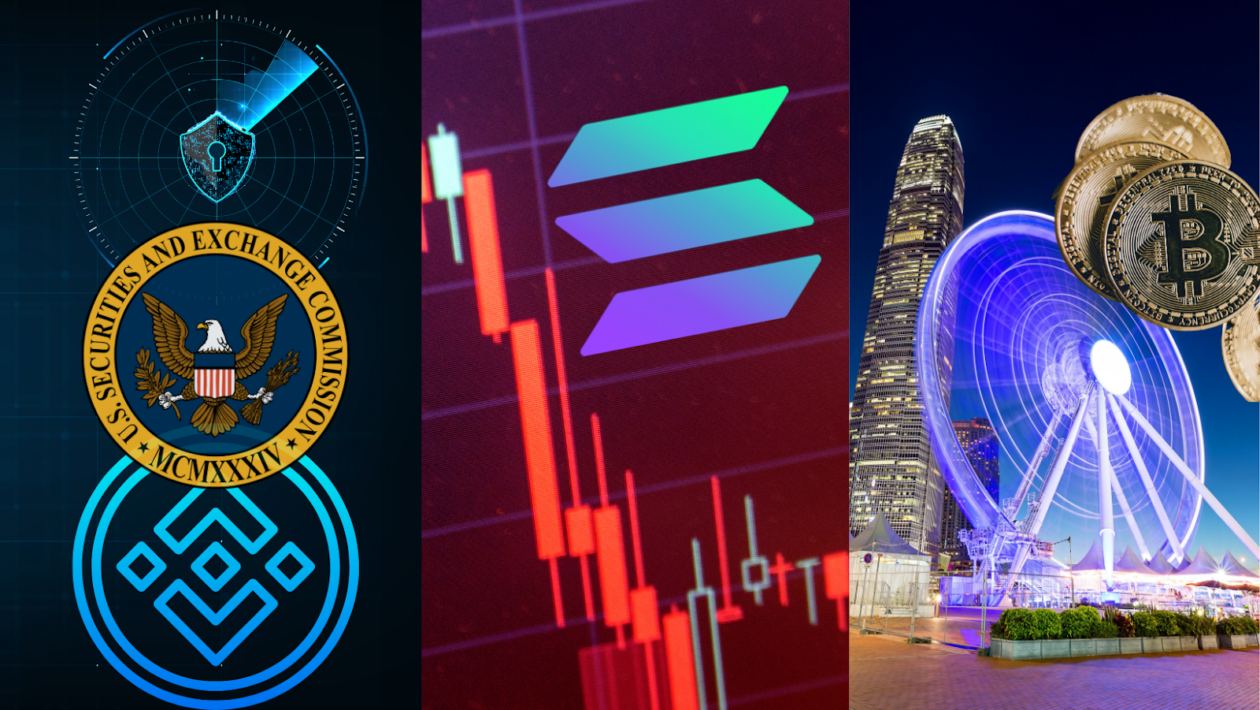In this issue
- Binance/Coinbase: Massive attack
- Solana NFTs: Bested by Bitcoin
- Hong Kong crypto: Regulatory rollout
From the Editor’s Desk
Dear Reader,
The U.S. Securities and Exchange Commission has pulled the trigger on some of the biggest cryptocurrencies in the world — and potentially all of them. By categorizing those cryptocurrencies as securities, it has the crypto industry in its clutches and facing a drawn-out legal battle.
It now appears that the regulator’s beef with Ripple and XRP was just the beginning. The SEC is now able to put to use the legal lessons it has learned in that years-long case against the tokens it has named in its complaint against Binance: BNB, BUSD, SOL, ADA, MATIC, FIL and ALGO, and implicitly more. The term “ripple effect” has acquired an unpalatable new meaning in crypto circles.
The SEC’s action on June 5 will go down as the crypto industry’s “Black Monday.” The regulator’s carpet bombing-style legal offensive wiped out US$320 million within 24 hours as crypto liquidations accelerated.
The real impact is only beginning to be felt, but the implications are enormous. Among other questions: What is a utility token? What is a security? Why is Ethereum considered a commodity by the Commodity Futures Trading Commission when Polygon, a layer-2 chain that scales Ethereum, is considered a security and now potentially finds itself in the SEC’s crosshairs? Is the mere fact that cryptocurrencies are sold and traded sufficient grounds for them to be considered securities and thus subjected to SEC regulation? (The Howey Test, established in 1946 and used as a means to determine whether a transaction qualifies as an investment contract, gives the SEC plenty of room for maneuver.) More SEC actions are likely in the works.
While it appears that the SEC is going after the industry, the ultimate victims may be Americans themselves. The “moat” that excludes Americans from services offered in most of the rest of the world and from the innovations offered by digital currencies is only getting deeper and wider. The legal liability and exposure that come with servicing even one U.S. citizen immediately render projects vulnerable to the SEC’s legal dragnet. No one will want to serve Americans. The very regulations that purport to protect investors will essentially rob them of access to digital assets.
Meanwhile, I’m in Hong Kong this week, half a world away, a city whose securities regulator has just launched new virtual asset service provider regulations. And for the retail market, it has released virtual asset trading platform rules, outlining a process that onboards crypto to trading platforms for accredited and non-accredited investors alike. Amid the SEC’s onslaught, such developments are leaving Americans in the dust. Freedom indeed.
Starve the industry of customers and reduce liquidity, and watch demand and business opportunities dry up in the U.S. Elsewhere, the market continues to thrive in new ways, only with diminished American input — and vice versa.
You can be sure that as U.S. customers find themselves cut off from off-ramping crypto to dollars, others around the world will be picking up bargains today as crypto activity elsewhere ramps up. The SEC has trained its sights on the crypto industry, but may have shot itself — and the country it’s supposed to serve — in the foot, hobbling America’s influence over the future of finance.
Until the next time,
Angie Lau,
Founder and Editor-in-Chief
Forkast
1. Regulatory reckoning

The U.S. Securities and Exchange Commission filed 13 charges against crypto exchange Binance, Binance Chief Executive Changpeng “CZ” Zhao, and BAM Trading Services — the Binance affiliate that operates Binance.US — on Monday, alleging multiple violations of securities laws. The following day, the regulator filed a lawsuit alleging similar violations against Coinbase.
- In the 136-page complaint the SEC filed to the District Court for the District of Columbia, the regulator alleged that despite Binance and Zhang having publicly claimed that U.S. users would be blocked from the platform, the exchange — the world’s largest — had been secretly providing services to high-value U.S. customers and had committed multiple other violations.
- “Through thirteen charges, we allege that Zhao and Binance entities engaged in an extensive web of deception, conflicts of interest, lack of disclosure, and calculated evasion of the law,” SEC Chair Gary Gensler said in a statement on Monday.
- The regulator charged Binance and BAM Trading with operating as unregistered securities exchanges, broker-dealers, and clearing agencies and with engaging in unregistered offers and sales of securities involving a dozen cryptocurrencies.
- The tokens the SEC listed as “crypto asset securities” in its complaint include Binance’s BNB token, stablecoin BUSD, Solana, Cardano’s ADA and Polygon’s MATIC. Taking into account the other tokens already targeted by the SEC, the value of the coins regarded as securities by the SEC amounts to US$115 billion, according to a Bloomberg report.
- Binance and its CEO were also charged with commingling or diverting customers’ assets as they pleased, an allegation that also appeared in connection with the collapse of crypto exchange FTX.
- The SEC alleged that the defendants commingled billions of U.S. dollars of investors’ assets and sent them to the bank account of an entity called Merit Peak Limited, which is also owned by Zhao. The regulator alleged that the funds were then transferred to a third party, apparently in connection with the purchase and sale of crypto assets.
- Wash trading also appears in the list of charges. The SEC complaint alleged that Sigma Chain — a crypto trading company allegedly owned and controlled by Zhao — had “artificially inflated” trading volumes on the Binance.US platform from at least September 2019 until June 2022.
- The SEC’s complaint seeks to permanently prevent Binance, Binance.US and Zhao from further violating U.S. federal laws, to compel them to disgorge “ill-gotten gains” with interest, to permanently prevent them from engaging in unregistered crypto transactions and crypto exchange and brokerage activities, to impose civil financial penalties, and to compensate investors.
- In response to the SEC’s lawsuit, Binance said in a statement that it had been cooperating with the SEC to “reach a negotiated settlement to resolve their investigations.” Binance said: “The SEC’s refusal to productively engage with us is just another example of the commission’s misguided and conscious refusal to provide much-needed clarity and guidance to the digital asset industry.”
- A Binance spokesperson told Forkast in an emailed statement that BNB and BUSD stablecoin were not securities. “Rather, BNB is a native token, designed to create an internal economy; thus, its value derives from its participants,” the spokesperson wrote.
- The SEC’s latest crypto lawsuit comes as another blow to Binance, not long after a lawsuit brought by the U.S. Commodity Futures Trading Commission (CFTC) in March over alleged violations of derivatives rules. Binance claims that it does not service customers in the U.S., having set up Binance.US as a separate company and platform for U.S. residents.
- Binance’s BNB coin, the 4th largest crypto by market cap, tumbled another 5.8% to US$261.31 in the 24 hours to press time, which is also its three-month low, according to CoinGecko data. But BNB is a relatively minor casualty in a development that has sent shockwaves through the crypto sector. While Bitcoin declined by 2.1% and Ether by 2.4% in the past 24 hours, Cardano dropped by 6.2% and Solana plunged 8.3%.
- “The industry will be very different in a year,” Markus Thielen, head of research and strategy at digital asset service platform Matrixport, told Forkast in an emailed note. “Trading volumes will likely drop further and pressure market makers’ revenue projections. Crypto in the U.S. will continue to go through a nuclear winter. The only viable option for crypto firms might be Hong Kong, where the regulator appears willing to offer a licensed level playing field.” Thielen also cited Hong Kong’s multibillion-dollar family office investors who are keen to fund crypto entrepreneurs and the Guangdong-Hong Kong-Macau Greater Bay Area for access to talent as reasons why the city will seem even more attractive to Web3 startups.
- The SEC continued its onslaught on Tuesday, filing a lawsuit against Coinbase in which it charged the company with operating as an unregistered national securities exchange, broker and clearing agency, and with engaging in unregistered offers and sales of crypto asset securities.
- The SEC has been slammed by many in the digital asset industry for its enforcement actions and lawsuits against crypto exchanges. The regulator fined U.S. crypto exchange Kraken and shut its crypto staking program in February, and charged Seattle-based crypto platform Bittrex with operating an unregistered exchange in April.
- In response to the SEC’s series of enforcement actions, Coinbase sued the commission in April, seeking clarity on crypto regulation.
Forkast.Insights | What does it mean?
Binance may have finally run out of road in the U.S. And it looks as though Coinbase might be in a similar predicament. Binance is now fighting cases against both the CFTC and the SEC. Coinbase, which has also had a fraught relationship with the SEC, is now also being sued for securities violations.
That means both exchanges will be formally frozen out of the world’s biggest single market for cryptocurrency while legal proceedings are under way — that is, if they don’t collapse first. Fund outflows from Binance have accelerated over the past few days, with more than US$300 million leaving the exchange in one 24-hour period this week.
The news, somewhat unsurprisingly, led to a slump in the broader crypto market, for two reasons. First, because both Binance and Coinbase have played an outsized role in crypto’s fortunes. Binance captured two-thirds of the Bitcoin spot trading market, and its BNB token helped it to overtake Ethereum by the number of active addresses. Coinbase had a similar hold on the U.S. market.
But perhaps the bigger, more concerning news for the market at large, is that the SEC is not just targeting crypto exchanges. In the regulator’s filing, Binance’s BNB, Binance stablecoin BUSD, Cardano’s ADA, Solana’s SOL, Polygon’s MATIC, Filecoin’s FIL and Algorand’s ALGO were all listed as unregistered securities.
That means other exchanges are now having to consider delisting some of the biggest projects by market cap to avoid regulatory risks. The currencies named in the suit are all nursing significant losses as a result.
The ongoing regulatory crackdown on crypto exchanges in the U.S., alongside the collapse of crypto-friendly banks earlier in the year, has significantly narrowed the on- and off-ramps for crypto investors. And although authorities in Asia and elsewhere have warmed to the industry, repairing the damage left by the U.S. government’s calamitous handling of crypto will likely take years.
2. Solana eclipse

Solana’s secondary non-fungible token (NFT) sales dropped nearly 50% in May, from US$85.7 million to US$44.9 million in April. The Forkast SOL NFT Composite, an index of NFT activity on the Solana blockchain, fell 12.13% during May.
- “The single reason for the major change in the Solana ecosystem is simply the impact of Bitcoin NFTs,” said Yehudah Petscher, an NFT strategist at Forkast Labs. “Since Bitcoin NFTs launched at the end of January, you can see Solana’s numbers steadily decreasing. Sellers, buyers [and] total transactions are all 50% or less than they were prior to Bitcoin NFTs.”
- Bitcoin NFTs became a reality after the January introduction of the Ordinals protocol, which allows data such as text and images to be inscribed on the Bitcoin blockchain.
- Bitcoin’s monthly NFT sales skyrocketed 474% in May, topping US$189 million, according to CryptoSlam, the data analytics arm of Forkast Labs. That boost made the Bitcoin network the world’s second-most-popular NFT chain, knocking Solana off a perch it had frequently occupied.
- “People who use Solana are likely already Bitcoin users, but it doesn’t work the other way around,” Petscher said. “I would assume that many who use Bitcoin don’t touch chains other than Ethereum. The point here is that the Bitcoin blockchain appeals to every single crypto and NFT trader, and the same can’t be said of Solana.”
- A recent surge in the popularity of memecoins has also been a factor in Solana’s falling NFT sales, according to Brian Boisjoli, a product manager at Forkast Labs.
- “The majority of people were trading memecoins instead of NFTs,” said Boisjoli, who has traded memecoins rather than NFTs amid the former’s recent popularity. “It suggests people are going to chase the hot item and leave the last shiny [NFT] in the dust.”
- The hype around Ordinals has propelled Bitcoin into a position to challenge Ethereum in the NFT space. Bitcoin’s May NFT sales of US$195.7 million stood at nearly half of Ethereum’s monthly total of US$356.8 million, the highest figure among all blockchains, according to data from CryptoSlam.
- Bitcoin’s monthly NFT sales surged 71.70% in the 24 hours to press time, but NFT sales on Ethereum dropped 10.82% over the same period, and the Forkast ETH NFT Composite fell 3.71%.
- “People should really pay attention to how significant, and how disruptive, Bitcoin NFTs are, especially if you are of the mind that Bitcoin NFTs volume could eclipse Ethereum’s in the future,” Petscher said. “At that point, will there be any demand for blockchains other than Bitcoin, Ethereum, and Ethereum’s layer-2s?” Petscher added that Bitcoin would likely continue to capture market share from other blockchains, reshaping the NFT landscape.
Forkast.Insights | What does it mean?
Innovation and investment in Web3 have over the past five years trended toward bigger, faster chains and the companies built on them. But an exploit in Bitcoin’s code and the introduction of a token standard by an anonymous Twitter user has meant that the oldest, slowest and most cumbersome chain in terms of utility has eroded many other chains’ unique selling points in the NFT space.
That’s because during market slumps, investors’ money tends to flow into Bitcoin and out of newer, more innovative chains. Bitcoin’s market dominance has crept up from a low of 39% in September 2022 to 48% today.
While historically that’s been due to the perception that Bitcoin is a useful store of value during market downturns, more recently, BTC’s growing dominance has been down to its ability to attract capital through inscriptions.
Bitcoin now boasts a US$600 million token economy spread across 24,000 tokens on its network, in addition to a thriving NFT marketplace. Although that’s rather smaller than Ethereum, Bitcoin achieved that impressive number in a few months, while chains such as Solana have taken years.
The ball is now back in the court of Solana and other ecosystems. Low fees and high speeds may have attracted developers to these networks, but they’ll need another big leap forward to tempt investors and developers to jump ship from Bitcoin again.
3. Golden East

Hong Kong has rolled out new rules for virtual asset trading platform operators, otherwise known as crypto exchanges. According to Gary Tiu, executive director and head of regulatory affairs at Hong Kong-based crypto exchange OSL, the city’s move potentially sets an example for other jurisdictions in its new embrace of retail crypto trading.
- Under its new licensing regime, Hong Kong will now allow licensed cryptocurrency trading platforms to offer services to retail investors and implement measures to protect individual traders, aiming to ensure suitability in onboarding processes, good governance, enhanced token due diligence, and clear admission criteria and disclosures.
- “Now, all the protections that Hong Kong has built — client asset protection, capital requirements, insurance requirements, and cyber security controls — are going to be available to retail investors,” Tiu told Forkast in an interview. “It’s a very good day for retail investors.” Hong Kong previously allowed only institutional and high-net-worth investors to trade crypto.
- Founded in 2018, OSL is one of only two digital asset trading platforms in Hong Kong that is licensed to offer services to professional investors. It has applied to the Hong Kong Securities and Futures Commission to upgrade its license to include retail cryptocurrency trading.
- As Hong Kong officially opens up crypto trading for the masses, companies in the space that are seeking to expand there should expect strict regulation, Hong Kong Monetary Authority Chief Executive Eddie Yue said last month.
- “[Anti-money laundering] controls applying to the regulated digital asset industry are pretty much going to be the norm going forward,” Tiu said. “But what sets Hong Kong apart is also the fact that, on top of AML, the Hong Kong regime will apply capital requirements, client asset segregation requirements [and other investor protections]. So, we have an equal playing field in the Hong Kong market. That’s certainly a good thing for Hong Kong and for investors. I think it will also be a very important reference point for other markets to study as well.”
- Hong Kong’s desire to allow retail crypto trading contrasts with the stance taken by rival Asian finance hub Singapore, which discourages speculative crypto trading, especially among retail investors. Thailand has banned crypto lending and staking services, and India has imposed steep taxes to discourage retail investors from crypto trading.
- Hong Kong could function as a sandbox for mainland China, which had imposed an all-out crypto ban in 2021, to test digital asset regulation. Late last month, China’s main national TV network reported on the city’s crypto regulations, and Beijing’s metropolitan government issued a Web 3.0 white paper.
- “It’s like what we did with Shenzhen in the Chinese economic reform in the 1980s,” Deng Jian-peng, a fintech law expert and law professor at the Central University of Finance and Economics in Beijing, told Forkast in an interview, referring to the development of the southern Chinese town as China’s first special economic zone. “We can evaluate the risks in crypto assets through the experiments in Hong Kong and then decide whether — or how to — adjust crypto regulation on the mainland.”
Forkast.Insights | What does it mean?
The unveiling of Hong Kong’s retail crypto trading framework comes at a critical juncture for the industry this week, as the SEC in the U.S. puts the legal squeeze on not only Binance and Coinbase but also a slew of major cryptocurrencies.
The U.S. government’s heavy-handed approach to enforcement is threatening to push crypto trading platforms out of the world’s largest economy — which means even greater opportunities for Hong Kong and other crypto hubs outside America to lure crypto firms to their shores.
Hong Kong’s new legal framework for crypto could also offer a regulatory path for other jurisdictions to follow.
Regulators in both the U.S. and Hong Kong pay much attention to tokens listed on exchanges, but while the U.S. increasingly treats tokens as unregistered securities, Hong Kong requires crypto exchanges to set up review committees to oversee the risks associated with coins listed on their platforms.
Hong Kong, aiming to turn itself into a global crypto hub, may reap a “conflict dividend” from the legal melee in the U.S. In addition to licensing retail crypto trading, the territory’s authorities have said they are working on offering expanded regulatory guidance on issues related to custody and stablecoins.
As crypto companies in the U.S. fight increasingly heated legal battles in and out of court, Asia — and in particular Hong Kong — may be an increasingly attractive proposition for crypto companies looking beyond American shores to do business in peace.




